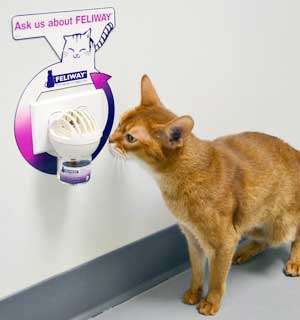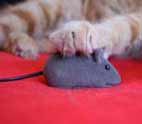Scared Cat
Help Your Nervous Cat
If you think you have a scared cat, or a depressed or nervous cat then you could be right, cats can suffer from stress and anxiety just like the rest of us!
Most of us are aware of how fear and anxiety can impact on our own lives and physical health.
But do we realize that the same is true for our pets, and that they can suffer from stress causing them to become very nervous or appear permanently scared and jumpy?
Cats love routine, familiarity and the feeling of security, so when they perceive that things are not how they usually are then they can feel anxious or even depressed, just like we can.
And if the cause of their stress is not recognized and improved, then their condition can continue to get worse, with possible implications for their physical health as well as simply making them very unhappy.
Fears and anxieties can develop into phobias and nervous behavior can become excessive and irrational, resulting in a timid, aggressive or scared cat.
So to help your scared cat be happy again, try following the tips and advice on these pages. Identify which simple changes you could make to prevent and alleviate their feline fears.
And why not try some of the relaxing pet products that are available such as Calm Care herbal drops, or a Comfort Zone w/ Diffuser scent diffuser to help your cat feel calm and secure until things have settled back to normal. After all, a worry-free kitty means a worry-free kitty owner!
Know The Signs of A Stressed or Scared Cat.
Recognizing the signs of cat stress or anxiety, and knowing what makes an animal become scared, can help us to get to the root of the problem. That way we can help our pet return to being a healthy and happy cat.
Common signs and changes in behavior that indicate stress can include:

- Urinating and defecating in inappropriate places inside the home - Although this sort of behavior can also be associated with a urinary infection which would require veterinary treatment, it is also a possible sign of stress.
- Spraying (territorial marking) even when neutered - This can be a sign that your cat is anxious and is trying to mark his territory so that it smells more like home.
- Aggressive behavior - A normally happy and passive cat can suddenly start to display aggression towards their owners for no apparent reason. However there is always some reason, the trouble is trying to find out what could cause such a behavioral change.
- Excessive grooming or not grooming at all - Often an anxious cat will spend hours licking and washing themselves over and over again. This can lead to bald patches or even sores and needs to be stopped as soon as possible.
Other signs of cat stress are:
- Dilated pupils.
- Pacing and restless behavior.
- Depression, lethargy and avoiding company.
- Hiding.
- Trying to escape.
- Loss of appetite.
- Increased meowing.
- Destructive behavior.
- Trembling and shaking.
Did you know that cats can also purr when stressed or when they are in pain which surprises a lot of people. It is believed that this is a natural mechanism that they will use to try to comfort themselves. So it is not unusual for a scared cat to spend a lot of time purring when there is no apparent reason for it.
Products To Help Reduce Cat Stress
|
Feliway is a well known product that mimics the natural pheromones in a cats scent helping them to feel safe and secure. Available in diffusers such as Comfort Zone w/ Diffuser, it can help you create a happy and contented home for both you and your cat. |
|
Relaxing herbal supplement drops such as Calm Care are also available. These are specially formulated by veterinarians to reduce anxiety in a safe and natural way and can simply be added to the cats food or directly into their mouth. |
Products such as these have been designed to help cats relax during periods of stress or change, allowing them to adjust to new situations and learning to calm down until things return to normal.
Check With The Vet!
In most cases your cat will display symptoms of stress for a short period of time and with a little help from us, return to normal by themselves. However, if the symptoms of stress return or becomes persistent, then it is always best to get your cat checked out by the vet.
This is because it is important to be able to rule out any underlying medical conditions that may be causing the problem. You can then concentrate on identifying other possible causes for the nervous cat behavior. Once identified, you can then set about alleviating the problem of cat stress for good.
Possible Causes of Stress Resulting In A Scared Cat
Environmental Causes:
- Loud noises from fireworks, building works, families arguing, thunderstorms.
- Changes of environment such as moving home or having the house decorated.
- Changes of routine such as changing your job and coming home at a different time of day or going away on holiday.
- A new baby or a new pet coming into the home can create feeling of jealousy or rejection.
- Having too many pets in a small space, being confined for long periods, or having insufficient fresh air.
- A new cat in the area can threaten your cats territorial instincts especially if it's a younger and stronger animal.
Emotional causes:
- Boredom and loneliness.
- Separation anxiety
- Death of a family member or other pet.
- Fear of aggression or shouting from a pet owner.
- Remembered behavior. For instance, if your cat came from a rescue home, then it may have had previous bad experiences that still affect it.
Physical causes:
- Obesity or malnourishment.
- Illness.
- Injury.
- Infestation of fleas, worms or other parasites.
- Allergies
There can be many other causes, but this should be a long enough list to get you thinking about what might be creating your cats stress or anxiety, causing tham to be a nervous, depressed or scared cat.
Helping An Anxious, Stressed or Scared Cat
As cat owners we must take responsibility in making sure that we do not cause our cats stress and to minimize anything which could make your pet anxious.
For instance :
- If your pet is scared of loud noises then obviously it makes sense to keep it indoors on stormy days or when fireworks are going off.
Keep them in the quietest room in the house with toys and food available and the curtains closed. Allow a place for your cat to retreat to, like a space under the sofa or a covered pet bed.
Some owners find that having music playing or the television on, or 'white noise' like a fan operating or the washing machine going, all help to cut out the frightening noises and help the animal feel that everything is normal.
- Make sure that you think of your cat when moving home or decorating the house. Take the time to make sure your cat has a safe place to hide and feel safe while all the changes are happening. See my page about how to move home with your cat here.
While you are making any necessary changes to your home environment and while your kitty is learning that it doesn't have to feel scared, you can also try using some of the stress reducing products currently available, such as Calm Care herbal drops, or Feliway diffusers such as Comfort Zone w/ Diffuser.
These products can help your pet through particular periods of stress, allowing them to feel more relaxed and you to feel less worried!
Always follow the advice of your vet, or you could consult a specialist in cat behavior problems if your cat does not recover over time.
How Your Own Behaviour Can Affect Your Feline Friend
As cat owners we must be aware of how our own behavior might affect our pets as well. Every owner knows just how much cats can be sensitive to our own moods.
They can often tell if we are sad, depressed, unwell or angry. If you are afraid during a thunderstorm or when fireworks are going off outside, your cat will pick up on the feelings of fear you are giving off.
So try to act confident and as if everything is normal. Another thing to bear in mind is how we react to nervous cat behavior.
It is very hard to resist petting and comforting them if they appear to be in distress in any way, but it is possible that by doing so, we are in fact reinforcing their scared cat behavior and making them feel that there really must be something to be afraid of. By stroking and comforting the cat we can be 'rewarding' the behavior so they learn to repeat it! Distraction can be a much better option, for instance a game with a piece of string or feather can help to take the cats mind off of the cause of their fear.
In extreme cases prescribed medication may be necessary and your vet is best placed to advise about this.
Alternative therapies such as homeopathy and plant essences can be tried, and special cat behavior training techniques can be used, but these need to be taught by a specialist.










